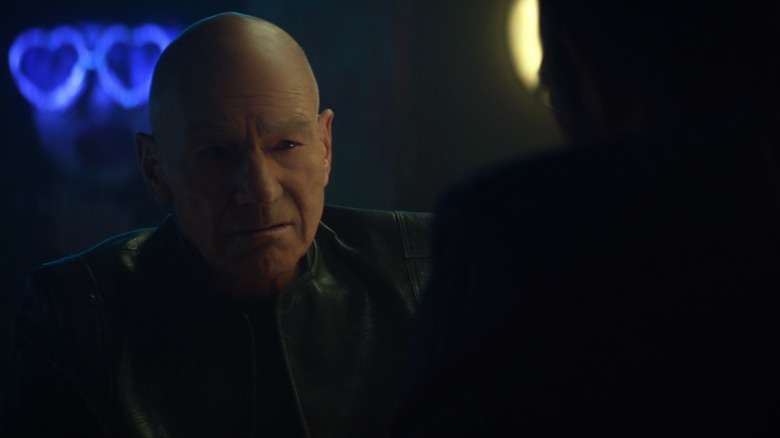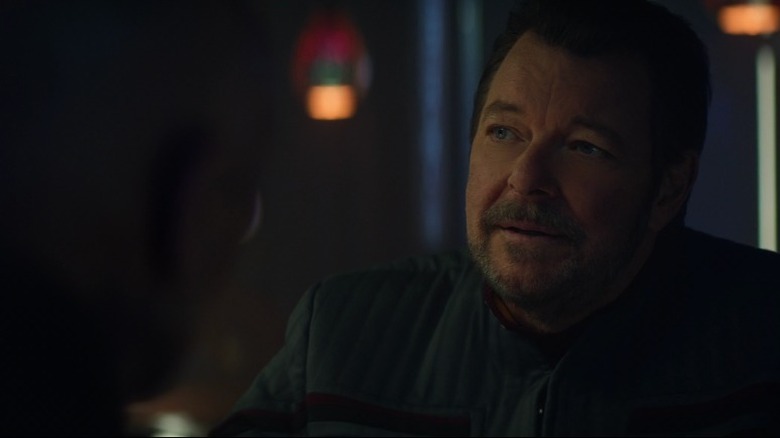Star Trek: Picard Season 3 Showcases The Franchise's Second Shot At De-Aging Tech
One thing I love about "Star Trek" as a franchise is that it isn't afraid to let its actors age. For all the talk of advancing technology that opens up a new world of possibility, its heroes don't seem particularly interested in immortality. Instead, the original cast of "Star Trek: The Next Generation" reappears on "Star Trek: Picard" looking a bit older and wiser, even, hilariously, if they're non-human entities. The show itself is largely about age, retrospect, and the urge to have a do-over of one's most regretful moments, so it's only fitting that it let its performers gracefully but truthfully portray the passage of time.
In a few situations, though, it makes sense for "Star Trek: Picard" to go the "Star Wars" route, which is to say, digitally de-age its beloved cast for flashback purposes. In this case, episode three of the final season of "Star Trek: Picard" features a post-"Star Trek: Nemesis"-era Riker (Jonathan Frakes, who directed this episode), Deanna (Marina Sirtis), and Picard (Patrick Stewart), with Riker telling Picard a story about the birth of his son. By the end of the scene, Deanna interrupts via a visual transmission with the newborn in question in her arms. It's a sweet moment that thankfully mostly side-steps the uncanny valley issues that often come with digital de-aging.
This isn't the first time "Star Trek: Picard" has dabbled in obvious de-aging. Back in its season two premiere, its Q (John De Lancie) reveal was aided by a shot of "Star Trek: The Next Generation"-era De Lancie that made it all the more thrilling. That one was a quick shot, as Q snapped his fingers to transform into an older version of himself seconds after appearing, but it was still pretty great-looking for a show that sometimes seems to only have three sets.
Does this sweet moment side-step the uncanny valley?
The new look at 20-years-younger Picard and Riker is also believable enough, even if the show clearly doesn't have the massive budget of something like a Marvel movie. The cast and crew of the series hyped up this final season as especially cinematic, and the framing device of Picard and Riker's conversation definitely lends a more epic scope to the episode. Plus, they don't look or sound especially unnerving, like the de-aged Luke Skywalker did in "The Book of Boba Fett." Sure, Riker's hair has some hard lines to it that make it look a little less fabulous than the real thing (fabulous present-day hairstyle included!), and you can hear the years a bit in Stewart's voice, but the pair are a passable if slightly digital-sheen shiny younger version of themselves. And Sirtis, shown only from a distance on a hazy screen, is classic Deanna.
While the de-aging in "Star Trek: Picard" looks good — better, I daresay, than plenty of the show's other effects — I hope "Star Trek" on the whole continues its trend of letting viewers grow up along with the shows' casts. The franchise has always felt timeless, but that doesn't mean it has to be ageless. Its stories often work because despite being set in the future, they're inspired by the present. That makes each series and film a time capsule of the era in which it was made, a delightful quality that allows for an endless revisiting of all our favorite moments. Seeing the original "Star Trek: The Next Generation" cast united at this moment in time, 20 years older than they last were, is a new entry in the time capsule, and a very welcome one.
New episodes of "Star Trek: Picard" stream Thursdays on Paramount+.

